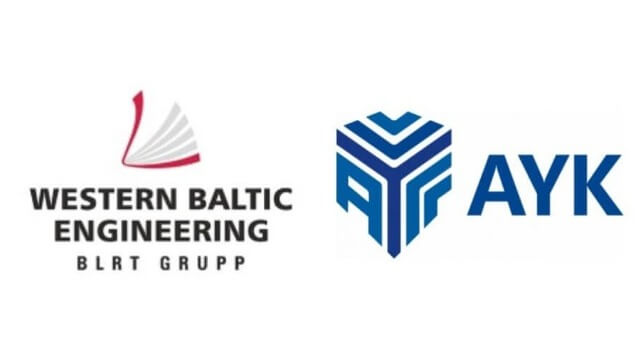AYK Energy and Western Baltic Engineering Strike Partnership


that matters most
Get the latest maritime news delivered to your inbox daily.
[By: Western Baltic Engineering]
Lithuanian ship designer Western Baltic Engineering (WBE) is accelerating the development of its recently unveiled electric ‘pusher’ vessel with the signing of a new partnership with rapidly expanding battery maker AYK Energy.
Klaipeda headquartered WBE said the agreement with Andorra based AYK Energy will see the companies collaborate on building the first electric pusher vessel, named the ELECTRIC EEL (see notes to editors 1), for the Lithuanian Inland Waterways Authority before expanding to the wider EU market.
The design partnership comes as the EU is ramping up pressure on member states to shift cargo from road to eco-friendly vessels on Europe’s extensive inland waterways network. Presently road freight, accounts for 75 per cent of inland cargo, while inland waterways account for just six per cent. EU strategies (see notes to editors 2) indicate that inland waterway transport and short-sea shipping should increase by 25 per cent by 2030 and by 50 per cent by 2050.
WBE’s Head of Sales & Marketing Egl? Mikalauskien?, said the partnership with AYK Energy will supercharge its drive to roll out different models of the ground-breaking vessel for use on Europe’s inland waterways and other major markets like the United States.
“We are absolutely delighted to extend our design partnership with AYK,” she said. “We are hugely impressed by Chris Kruger and his team at AYK in how they have helped us develop the ELECTRIC EEL to date. AYK’s dedication to innovation, experience of the marine battery market and ownership of their manufacturing facility in China makes them an ideal partner to provide batteries for these vessels.”
AYK Energy president Chris Kruger said AYK is well placed to support WBE due to its unique experience of the marine battery market working on vessels including tugs, dive support vessels and ferries.
“We are thrilled to strike this design partnership with WBE,” he said. “We have been very impressed by WBE’s vision to electrify inland waterway transportation, it is long overdue and is exactly the type of project we want to work on. The AYK team’s knowledge of the marine battery sector from R&D to installation gives us a real competitive edge. Drawing on this expertise AYK has pioneered ten different series of marine batteries which have been tested by leading integrators such as Wartsila and certified by DNV. Leading the R&D team I also bring experience of the electric car sector as well as developing the very first marine type approved battery for Corvus Energy before setting up AYK. We want to bring all that knowledge and passion to help drive WBE’s ELECTRIC EEL project.”
Mrs Mikalauskien? said since launching the ELECTRIC EEL design the company’s senior sales manager Chris Cowan has received a rush of interest from operators keen to replace diesel vessels, which presently dominate the market for transporting non-propelled barges around Europe’s inland waterways.
“Our initial design is for a low draft pusher but we are receiving lots of interest for deeper draft models as well as for vessels which can pull as well as push,” she said. “It is brilliant to see our concept capture the imagination and working with AYK we can now design alternative models, with different shape batteries and power voltage, to meet owners’ requirements.”
Mr Kruger confirmed the new partnership will focus on initially deploying its Aries + model 17.6 KW hour li-ion batteries with the potential to expand to its 23.3 KW hour Centarus & Aquarius ranges.
Mrs Mikalauskien? said the potential market is very attractive. According to figures there is a fleet of 332 diesel pushers on the Danube alone pushing more than 2000 non-propelled barges.
“We estimate each of these vessels is emitting 196,317 KGs Tank To Wheel (TTW) of CO2, per navigation, while our electric pusher design slashes this at a stroke as it emits zero CO2,” she said. “The beauty of our design is also in its ease of use, it can be bought and then built at a local shipyard near the customer or we can built it in Lithuania. We believe our electric pusher can play a critical role in the drive to transform the IWT of Lithuania as well as the Danube and Rhine.”
The products and services herein described in this press release are not endorsed by The Maritime Executive.
